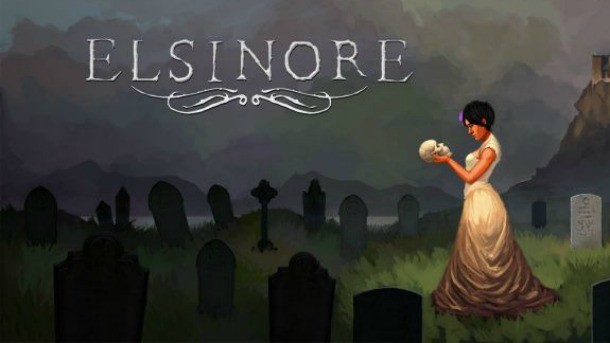Our extra-large special edition is here. Subscribe today and receive the 25% longer issue at no extra cost!
Elsinore

It's been a little odd this past week trying to explain Elsinore to people who haven't seen or played it. The closest I've gotten to a concise, accurate statement is saying that it's Hamlet but with a healthy dose of Harold Ramis' Groundhog Day thrown in. Elsinore doesn't cast you as the infamous brooding prince but instead as Ophelia, who in the play ostensibly loses her mind after Hamlet kills her father and then drowns in a pond, possibly killing herself shortly before all the other main characters in the play die. Ophelia's goal in Elsinore is to prevent the play's ridiculous bodycount from ever happening. Every time she doesn't, she's thrown back four days into the past, doomed to repeat the cycle of violence and bloodshed until she can break it.
Elsinore's writer Katie Chironis, says the idea for the game came about while she was in school. "The idea came from me, I was doing a lot of work breaking down Shakespeare at school where I was doing a writing degree and at the same time learning to make games and...y'know, there's this concept of 'lose lose lose' in Tragedy where in games it's usually 'win win win.' So I had this idea to take the two and drop them together and try to invert that power fantasy concept."
The game is presented as an isometric point-and-click adventure, with you clicking where you want Ophelia to go and on which characters you want her talk to. In the top left corner of the screen, a clock ticks away as time and the events of the play move on regardless of your actions, creating a sense of anxiety. Ophelia can't forcibly prevent anyone from doing what they're going to do in the play but instead you have to rely on your wit, telling characters certain bits of information (like informing Gertrude that Claudius killed her last husband) that might lead them away from their set path, though it might just result in them dying or killing someone else in another way elsewhere.
When I asked the team if they considered the game to be a fatalistic work or if the player could win in any conventional sort of way, designer Connor Fallon said "There's not an objective...'best' way to end it but there are better outcomes."
"The default outcome is that she dies," engineer Eric Butler adds, "so almost any other outcome is better for her at least."
Chironis offers a detailed explanation: " There are a number of ways to end the loop. There is a sort of definitive point where the player unlocks the ability to choose an ending, and there are a number to choose from. You look at a lot of these games like 999 [999: 9 Hours, 9 Person, 9 Doors] and they have 'the true ending,' which is kind of crappy. We wanted to avoid that and sort of play into this concept that you are trapped into this tragic time loop and the universe is conspiring against you but you have the power of choice. As in the real world, there is no perfect, correct course of action, only the sort of grey areas in the middle that we can choose without really knowing what the outcome is going to be."
I only got to play a slice of Elsinore but came away impressed during my time with it. It's a small game filled with large ambitions that will likely appeal to players who like games that try to give them meaningful choices. Elsinore will be out in 2016 for PC. You can find out more about the game here.

Get the Game Informer Print Edition!
Explore your favorite games in premium print format, delivered to your door.
- 10 issues per year
- Only $4.80 per issue
- Full digital magazine archive access
- Since 1991










